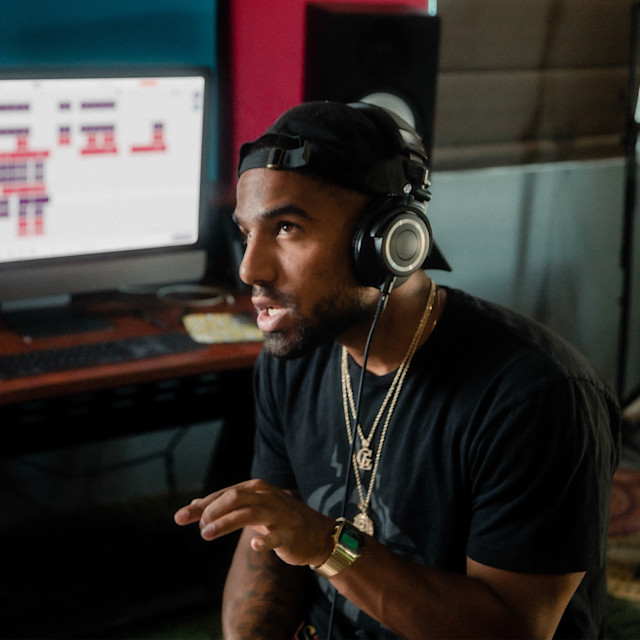How To Become A Successful Songwriter: Pro Tips
August 27, 2024 - Learn how to become a successful songwriter with our pro tips. Discover techniques, tools, and industry insights to refine your craft and make your mark.

Songwriting is a unique blend of creativity and technical skill. Becoming a successful songwriter involves capturing emotions in a way that resonates with listeners.
You'll need talent, of course, but also a deep understanding of the craft and willingness to put in the work. Have you heard the saying that it takes 10,000 hours to become an expert at anything? It definitely applies here.
How To Become a Successful Songwriter
Many of the greatest songwriters have left an indelible mark on music by writing songs that transcend time. They often draw from personal experiences, painting vivid pictures with their lyrics and melodies.
If you're just starting out, don't be discouraged. Writing a song can begin with something as simple as a chord progression or a lyrical phrase. When you're working on a song for the first time, my advice is this: Focus more on enjoying the process and learning the craft rather than worrying about immediately writing the next biggest hit.
The key is to keep writing, experimenting, and refining your craft until you develop a unique voice that stands out. You can create songs that captivate and inspire audiences with dedication and the right resources.
Songwriting Fundamentals
Song Structure and Melody Creation
A powerful song structure can distinguish great songs from an ordinary good song.
Typically, songs are divided into different sections: verses, choruses, and bridges. The second verse often continues the story or theme introduced in the first.
A chorus with a higher pitch or energetic lift stands out to listeners and helps highlight the song's title and main hooks.
The perfect song often balances repetition and novelty to stay engaging. Playing around with the song structure can lead to new ideas and unexpected results in your songwriting process. It's also important that the melody is catchy and memorable.
Chord Progressions
Chord progressions form the backbone of your song's harmony. Common progressions like I-IV-V are popular because they provide a solid foundation.
Experimenting with unique or unexpected chord progressions can set your song apart and help bring out your unique style and sound.
Lyric Development
Creative lyrics are your chance to tell a story or evoke emotions. Setting yourself regular goals, such as writing a few lines daily, can enhance your songwriting skills and help create a routine that keeps you in the creative zone.
Consistency helps you develop your voice and bring out unique perspectives, making your songs more relatable and compelling.
The balance between harmony and words transforms simple notes and lines into some of the best and most memorable pieces.
Creative Process and Overcoming Challenges
Creating music involves constantly finding inspiration and dealing with obstacles like writer's block. Understanding both aspects can help you refine your craft and produce great music.
Finding Inspiration and Generating New Song Ideas
Observe Your Surroundings
Inspiration can come from everyday experiences, emotions, and personal stories. Observing your surroundings or listening to other artists can also spark new ideas.
Always pay attention to stories you hear in movies or read in books, and listen to unique ways people use words to describe their stories and the emotions they experienced.
Often, my best work comes from ideas I get from hearing someone else's story, which I then use as inspiration for lyrics and musical ideas.
Keep a Journal
Regularly jot down thoughts, feelings, or interesting lines that come to mind. This is a great way to keep your creative ideas flowing daily, even if you don't have time to sit down and work on a song.
Try Different Genres
In my experience, this often results in unique and different approaches that I might not have thought otherwise. Feel free to experiment with various styles; it can lead to a unique sound and inspiration that you didn't even know existed.
Collaborate
Collaboration with others is probably the most important tool I use all the time. Working with fellow musicians can open up new perspectives and creativity. Plus, it can make the whole process really enjoyable as you get to hang out with like-minded individuals.
Find cowriters with strengths in areas outside of your expertise, and focus your efforts on your strongest areas.
Use Prompts
Use prompts or exercises. Sometimes, a simple prompt like writing about a specific emotion or event can kick-start the creative process.
And let me clarify something here - I'm not talking about AI prompts! Sure, you could use AI to generate topic ideas or overall storylines, but write your own lyrics. There are no shortcuts to becoming a great songwriter!

Dealing with Writer’s Block
Writer’s block is a common challenge faced by many songwriters. It can feel overwhelming, but it's important not to let it halt your progress.
There are some easy steps you can take to alleviate or find a way around writer's block when it happens:
Set Small Goals
Write a few lines each day rather than aiming for an entire song at once.
When your creative juices are flowing, by all means, go to town and write as much as you can. But when writing feels like trying to squeeze water out of a stone, just stick to your routine and write anything you can come up with.
The routine will make the creative process easier, and eventually, you'll find that writer's block doesn't really happen much at all.
Embrace Imperfection
Allow yourself to write freely without self-criticism. Not every song has to be perfect.
I think this is extremely important. The perfectionist in all of us would love to always strive for absolute perfection, but that's not real life. It's simply impossible to achieve it with every song.
Enjoy the process, and keep writing. The hits will come when they come.
Take Breaks
Sometimes, stepping away from your work can provide new clarity. Engage in different activities to refresh your mind. Watch a movie, read a book, hit the gym, or go for a walk in nature. Do something relaxing, something that's not music.
Seek Feedback
Getting input from others can offer fresh insights and help overcome creative blocks. Reach out to friends, mentors, or other professional songwriters for advice and encouragement.
I have one important piece of feedback advice: Remember that your grandma will always love everything you do.
Find mentors and colleagues in the industry whose opinions you respect and trust and who are willing to give it to you straight rather than please you with their feedback.
The only way you can learn and improve is if you get clear, constructive feedback. It will make you a better songwriter in the long run.

Building a Career as a Songwriter
Becoming a successful songwriter involves a mix of creative skills and business acumen.
Understanding how to navigate the music business is essential to ensuring your music reaches a wide audience.
Navigating the Business of Songwriting
You should learn about royalties, different revenue streams, and how deals are typically structured. Taking courses at institutions like Berklee College of Music can provide valuable insights into the business aspects.
It is also vital to form connections with important music industry figures. Networking with producers, recording artists, and music publishers can open doors.
Attending music conferences and workshops is a great way to meet potential collaborators. Successful songwriters often emphasize the importance of these relationships in their careers.
Joining songwriter associations is another step. Organizations like the American Society of Composers, Authors, and Publishers (ASCAP) or Broadcast Music, Inc. (BMI) offer resources and support while also collecting performance royalties for you once your songs are out in the world, generating royalties.
Securing a Publishing Deal
A publishing deal can be a significant career milestone, offering financial support and industry connections. A publisher can help get your songs to a record label or find sync deals.
Prepare a professional portfolio. This should include high-quality recordings and well-written lyrics. To boost your credibility, highlight collaborations with major artists or successful songwriters.
Submit your work to publishing companies or hire a music attorney to negotiate deals. A good publisher can help get your songs placed in films, TV shows, or with famous artists, increasing exposure and revenue.
If you are also an artist, you can build a rewarding career as a songwriter by focusing on both your artistic development and business strategy.
Understanding Copyright Laws
Copyright laws are crucial for songwriters. They protect your creative work, ensuring you receive proper compensation and recognition.
When you write a song, you automatically own the copyright. This grants you exclusive rights to reproduce, distribute, and perform your work.
Navigating copyright laws can be complex. You might work with music publishers or legal experts who help secure publishing deals and manage royalty payments. And since royalties can be a significant income stream that is paid whenever your songs are played or sold, it's important to understand the laws and what constitutes a fair publishing deal.
You must also stay informed about changing laws as the industry evolves.
Here's another important piece of advice I have for you - Always seek legal advice from a music attorney to review and explain any contracts you are offered. Never just sign a contract before you completely understand what the terms are.

Leveraging Technology and Tools for Songwriting
Technology has revolutionized the way you can create and record your songs. With various innovative tools and online platforms available, creating music has become more accessible, regardless of your experience level.
Digital Audio Workstations (DAWs)
DAWs today are incredible. You can run a full production setup off your laptop in your bedroom. Yes, professional studios absolutely still have their place in the industry and are very much needed. However, creating high-quality recordings for your own songs is possible even on a low budget, using just a laptop and a few other key pieces of equipment.
All modern DAWs have professional-level features that will help you create professional-level recordings. Soundtrap, Logic Pro, Pro Tools, Ableton Live, FL Studio and Cubase are all great options, and it really comes down to your preferred workflow.
One feature that differentiates Soundtrap from the others is it's all online. This means you can set up a recording studio without buying any software, making sharing your ideas with your collaborators easy and affordable.
You can utilize DAWs in many ways, from recording just ideas and rough demos to producing release-ready finished recordings. It all depends on your skill set and goals.
If producing tracks isn't your thing but you're strong in lyrics and melody, then it's a good idea to focus on toplining and find producers who match you well stylistically. This way, you'll always end up with the best song possible. You can still use a DAW to record your ideas.
Conclusion
Becoming a successful songwriter involves combining creativity, technical skill, and strategic industry navigation.
The key is to refine your craft continually. Your unique voice and dedication are what truly set you apart.
There are many ways to succeed as a songwriter. Focus on writing amazing songs you enjoy, and find like-minded collaborators that help push you and create your best work along the way.
Stay persistent, embrace feedback, and keep creating—the rest of the song will fall into place.
About the author
Tero Potila is a professional music composer and producer. His career combining knowledge and experience from music, TV, film, ad, and game industries gives him a unique perspective that he shares through posts on teropotila.com.
Get started with Soundtrap today!